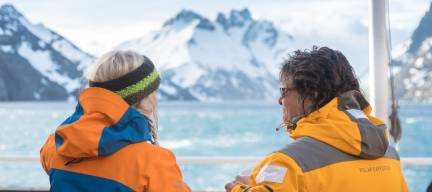
Planet
Polar Promise
Environmental stewardship is key to our polar operations. We are working to reduce our carbon emissions per passenger by 20% through fleet upgrades, operational efficiencies, and technology investments. We are also collaborating with our supply chain partners to measure, report, and reduce our collective environmental impact. Additionally, we are committed to reducing, reusing, or recycling 100% of the waste generated on Quark Expeditions-owned vessels.
By 2025, Quark Expeditions will reduce carbon emissions per passenger by 20% from 2019, and the Quark Expeditions-owned fleet will be zero waste to landfill.
Why this matters
Protecting and preserving natural resources is not only essential for the health and well-being of our planet but also for the long-term viability of our businesses. By reducing waste, lowering emissions, and conserving biodiversity, we contribute positively to the global fight against climate change and environmental degradation.
Carbon Accounting
At Quark Expeditions, our commitment to sustainability extends to every aspect of our operations, from the remote polar regions we explore to the way we manage our environmental impact. Carbon accounting plays a pivotal role in this commitment, providing us with a clear and measurable understanding of our greenhouse gas (GHG) footprint. By systematically tracking and managing these emissions, we can take informed actions to minimize our environmental footprint and contribute to global efforts to combat climate change.
In 2023, Quark Expeditions undertook a full accounting of our GHG emissions with the support of Travelopia, our parent company, and a 3rd party carbon consultant.
In 2023
-7%
Scope 1 GHG Emissions
+17%
Distance Travelled
$800,000
Invested in ship efficiency
About Materiality
Materiality in carbon emissions is all about pinpointing the most significant impacts of our operations. It’s the process of identifying, prioritizing, and managing the sources of emissions that make the biggest difference to our business and stakeholders. Focusing on our most material carbon emissions first ensures that our efforts are directed at areas where we can make the most substantial difference.
For more detail on our carbon accounting, please read that section in the Sustainability Report
View Our Sustainability Report 2023Moving Towards Zero Waste
Our journey towards zero waste to landfill is a continuous effort that involves innovation, collaboration, and education. By leveraging advanced waste management technologies and adopting sustainable practices, Quark Expeditions is dedicated to leading by example.
In 2023, two-thirds of our fleet, specifically Ultramarine and World Explorer, were equipped with Micro Auto-Gasification Systems. These state-of-the-art waste management systems are designed to significantly reduce the volume of waste by converting it to an inert solid carbon through a high-temperature process. This technology is one pillar of our strategy to minimize the impact of our operations.
We continue to identify and eliminate single-use items across our fleet. Items such as straws and napkins have already been drastically reduced by making them available by request only. This shift not only decreases waste but also helps to promote a culture of sustainability among our guests, staff, and crew.

6,700
Parka bags by removing individual parka packaging

360,000
Water bottles by providing reusable water bottles and refilling stations

68,000
Toiletry containers by providing bulk shampoo, conditioner, and soap
Quark Expeditions recognizes the critical importance of moving towards eliminating waste before it is generated, particularly given the lack of recycling infrastructure in the remote areas where we operate.
Education and Enrichment
Quark Expeditions expedition is more than just a travel experience; it is an immersive journey that fosters a profound understanding of the Arctic and Antarctic ecosystems, their wildlife, and the pressing conservation issues they face. Each is designed to deeply engage guests with the unique environments of the polar regions. Our ships serve as platforms for education, staffed with experts in ornithology, biology, geology, glaciology, history, photography, culture, and other topics salient to the voyage. Throughout their voyage, our expert expedition team guides guests in identifying and understanding the behaviors of the unique species inhabiting the polar regions. Whether it’s spotting walrus lounging on ice floes from the deck, observing penguin colonies on a Zodiac cruise, or witnessing the majestic movements of whales, guests gain a profound appreciation for the region’s biodiversity. Quark Expeditions’ education and enrichment program provides a holistic and immersive experience, building deep connections with the polar environments.





